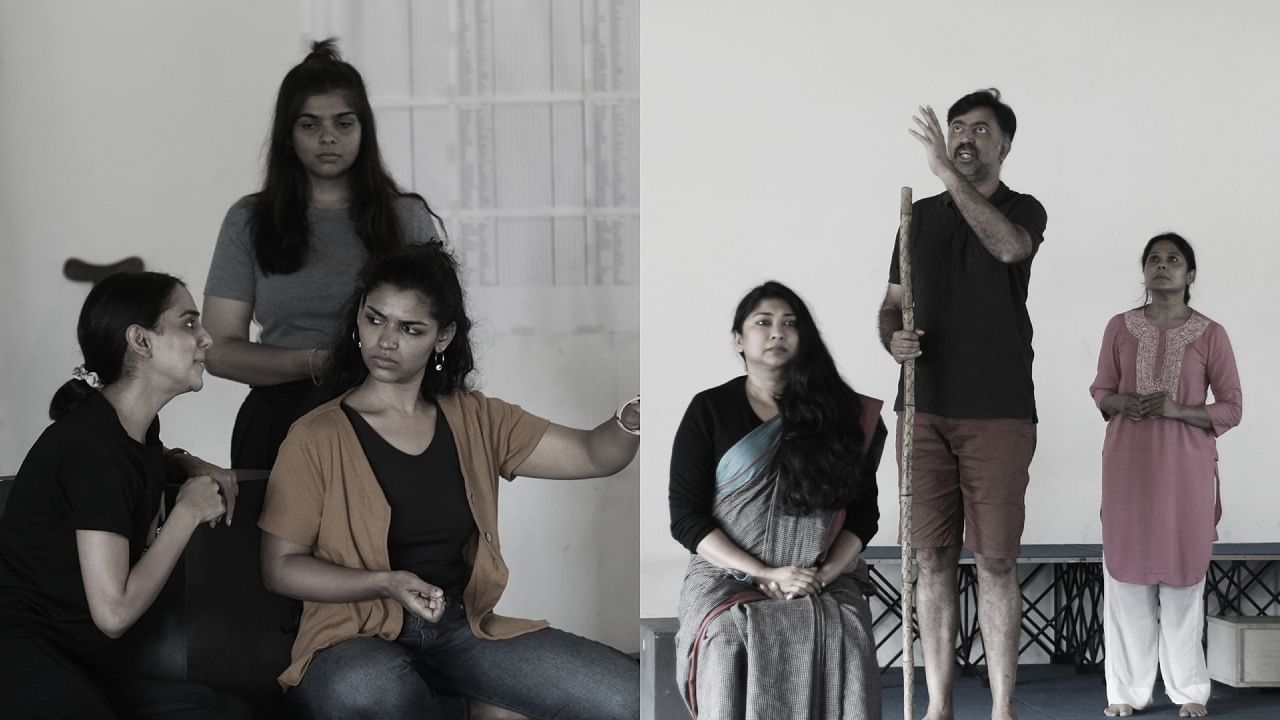
Cast of 'Parva' during rehearsals.
Photo: Special arrangement
Prakash Belawadi will bring to stage the English adaptation of S L Bhyrappa’s novel, ‘Parva’, next week. It is a retelling of the ancient Sanskrit epic, ‘Mahabharata’.
The eight-hour play will be performed in five acts and will have four intervals. The team started rehearsals in July after a reading by Prakash Belawadi in April.
Belawadi had earlier adapted the novel in Kannada for the theatre group Rangayana. They have staged 43 shows across Karnataka, Mumbai and Pune. The English adaptation will be performed by Centre for Film and Drama and is produced by Eneno Ase. The lead characters are played by Abhijeet Shetty, Divya Raghuram, Krishna Hebbale, Naveen Kumar J, Siri Ravikumar, Shibani Rao, and Harish Seshadri, among others.
Bhyrappa’s ‘Parva’ is a rational interpretation of the ‘Mahabharata’. He replaces myth with realism. Gandhari has only 14 children and the rest of the 86 children are a result of Dhritarashtra’s multiple affairs, unlike the complex narrative in the epic. ‘Parva’ also lays emphasis on the perspective of women.
The set is designed by Shashidhar Adapa, a four-time recipient of the state award for Best Art Direction. While Prasad Bidappa is the wardrobe consultant, the costumes are designed by Sankeerthi Aipanjiguly. The background music will be performed live by Ravi Murur and troupe.
To keep the audience engaged is the fundamental demand of any performance, the longer the play, the tougher it gets. They must keep coming back for more after each of the four intervals!
From October 19 to 22 at Chowdiah Memorial Hall, Vyalikaval. Tickets online.
IN CONVERSATION WITH PRAKASH BELAWADI:
What inspired you to adapt Bhyrappa's 'Parva' for theatre?
At the core of drama is conflict — to do or not to do. 'Parva', the novel, takes the plots and subplots of the Mahabharata and imaginatively delineates them in dialogue between characters and their various streams of consciousness. It raises questions like: Is it dharma for an heirless king to permit his queen to beget sons by another man (niyoga)? Are children born by niyoga entitled to bear the king's name, get a share of the kingdom? Is loyalty to the king and kingdom a higher moral duty for a soldier than fighting for the right cause? Does a code of honourable conduct between two sides make practical sense in a bloody war in which you kill or get killed? These conflicts are the very stuff of theatre.
This is what drew me to the text.
Prakash Belawadi.
Photo: Special arrangement
What were the factors you kept in mind while adapting it to English?
I would say finding the most suitable idiom and register in the English language when translating the text from the original, keeping in mind the mood and complexity of the situation, the stakes involved, thought and intent of each character and their differences in rank and age.
What were the challenges of directing a play of this length?
To keep the audience engaged is the fundamental demand of any performance, the longer the play, the tougher it gets. They must keep coming back for more after each of the four intervals!